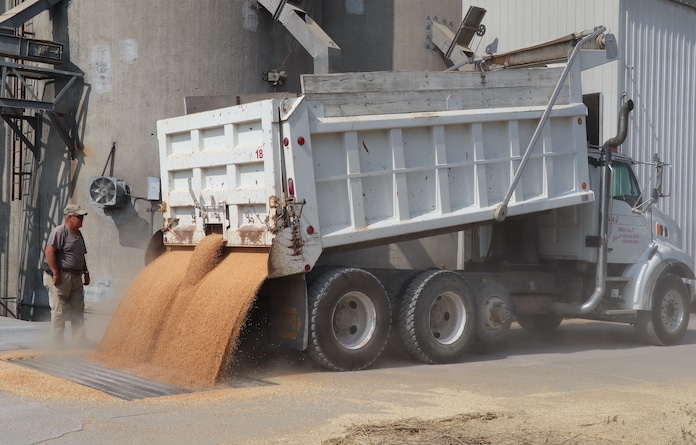A dry time for farmers

With farmers finishing up the summer wheat harvest amid a substantial drought, it’s currently looking to be a mixed year for agriculture in Monroe County.
Per Farm Week, the entire state is currently handling the drought, with all 102 counties in Illinois facing abnormally dry conditions.
Average precipitation for the state between April and early June is the second lowest on record dating back to 1951, with the only drier year being 1988.
The impact on growing crops is tremendous, with the percentage of crops rated good to excellent in Illinois standing at 36 percent for corn and 33 percent for soybeans.
Gateway FS Grain Originator Michael Biethman offered some more focused perspective for how farmers in Monroe County are handling things.
In regard to the ongoing wheat harvest, he noted yields have been respectable, with farmers reporting 85-100 bushels per acre.
Biethman attributed the crop’s good quality and subsequently good test weight with the decent weather farmers enjoyed earlier in the year – though he also noted the importance of various inputs on a quality harvest.
“Your fertilizers and your herbicides and your fungicides particularly, they did their job this year very well, and the inputs that the farmers put on the crop led to a very good quality crop,” Biethman said.
Concerning the ongoing drought, Biethman spoke to the benefits of rain this county has seen for the past few weekends.
While the rain, he said, has undoubtedly been appreciated by farmers, the precipitation is chiefly important in the coming days as soybeans and corn mature – specifically as corn planted months ago finally begins to tassel, producing pollen in order for the corn ear to grow and ripen.
Similarly, soybeans tend to pollinate in late July, and thus need more moisture then.
“The timely rains are really in July,” Biethman said. “This was a good rain, don’t get me wrong. Everybody’s pretty happy with it. Three weeks to about a month out is when we’re really gonna be praying for rain.”
Biethman also touched on the subject of overall profit for farmers, as fluctuating input costs and grain prices have led to concerns for many.
“Input costs were higher last year than they were this year, but the price of grain last year was higher than it was this year, so both have kinda come down,” Biethman said.
Several farmers in the area offered perspectives on how they’ve been handling the wheat harvest and recent drought.
Dan Mueller, who owns farmland in both the bottoms and central Monroe County, said his wheat harvest has been very good this year, with 70-90 bushels per acre.
He expressed concern about the ongoing drought, noting the rains are still very much needed now.
The old saying “knee high at the Fourth of July” isn’t very applicable nowadays, he said, as much of the corn crop has already started tasseling.
Mueller also noted the relationship between input costs and grain prices has been difficult to deal with, and such issues can also lead to more down the line as prices impact seed costs and other factors for next year’s planting.
Another area farmer, George Obernagel, similarly spoke positively about the wheat harvest, adding the dry spell this county is experiencing is bound to lead to diminished yields down the line.
“It is gonna be starting to affect yields,” Obernagel said. “Some of the fields in the bottoms, I wish they did see some rain while they’re tasseling, but if you get this 100 degree weather, that affects the tasseling to produce the crop. We’re just in a dire need of rain, and it’s across the state.”
Monroe County Farm Bureau President Bruce Brinkman, who primarily farms in the bottoms, said wheat harvests have been generally OK, with yields slightly better than average.
Input costs, he said, have been higher this year than any previous year he’s farmed.
The ongoing lack of moisture is concerning for him. While the occasional rains have kept the crop alive, corn that’s currently tasselling desperately needs the moisture to pollinate.
“How it’s hanging in there, I have no idea,” Brinkman said. “It’s surviving some pretty tough time here. The small rain is keeping it going that we get here and there, but with the heat and wind coming up this week, it’s gonna get pretty ugly.”
With the drought set to heavily impact the eventual grain harvest, Brinkman said that impact is bound to be felt all over.
As he raises livestock in Monroe County, reduced grain yields would raise grain prices, and farmers having to pay for feed could get hit hard.
Despite the concerns, Brinkman seemed decently optimistic.
While he’s heard some compare this dry spell to the drought of 2012, he noted this year at least had a decent start, and farmers will simply have to find a way to manage as the summer goes on.
“It’s been unusual challenges,” Brinkman said. “Not nothing new. Every year is different. New challenges, new experiences. What worked last year probably won’t work this year 100 percent, so we have to go with the flexibility of being able to adapt as we’re challenged with different obstacles.”






